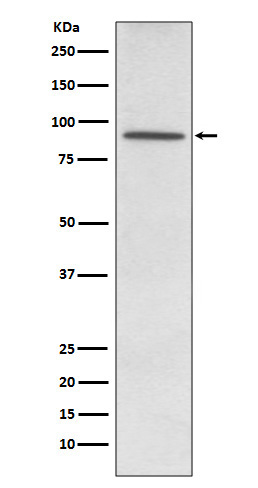
| WB | 咨询技术 | Human,Mouse,Rat |
| IF | 咨询技术 | Human,Mouse,Rat |
| IHC | 咨询技术 | Human,Mouse,Rat |
| ICC | 技术咨询 | Human,Mouse,Rat |
| FCM | 咨询技术 | Human,Mouse,Rat |
| Elisa | 咨询技术 | Human,Mouse,Rat |
| Aliases | DPDE3; HSPDE4D; PDE43; Pde4d; PDE4DN2; STRK1;;PDE4D |
| WB Predicted band size | 91 kDa |
| Host/Isotype | Rabbit IgG |
| Antibody Type | Primary antibody |
| Storage | Store at 4°C short term. Aliquot and store at -20°C long term. Avoid freeze/thaw cycles. |
| Species Reactivity | Human |
| Immunogen | A synthesized peptide derived from human PDE4D |
| Formulation | Purified antibody in PBS with 0.05% sodium azide,0.05% BSA and 50% glycerol. |
+ +
以下是关于PDE4D抗体的3篇参考文献示例(注:以下内容为模拟示例,实际文献需根据具体数据库检索):
1. **文献名称**:*"Phosphodiesterase 4D (PDE4D) in Alzheimer’s Disease: A Novel Target for Tauopathy"*
**作者**:Zhang Y, et al.
**摘要**:研究使用PDE4D特异性抗体分析阿尔茨海默病小鼠模型中PDE4D蛋白的表达与定位,发现其与tau蛋白异常磷酸化相关,提示PDE4D可能通过调控cAMP信号影响神经退行性病变。
2. **文献名称**:*"Development and Validation of a PDE4D-Specific Monoclonal Antibody for Cancer Biomarker Studies"*
**作者**:Smith J, et al.
**摘要**:报道一种新型抗PDE4D单克隆抗体的开发,通过Western blot和免疫组化验证其特异性,并应用于前列腺癌组织样本检测,发现PDE4D高表达与肿瘤侵袭性相关。
3. **文献名称**:*"PDE4D Isoforms in Inflammatory Diseases: Antibody-Based Profiling and Therapeutic Implications"*
**作者**:Lee S, et al.
**摘要**:利用多种PDE4D亚型特异性抗体,分析不同炎症模型中PDE4D的表达差异,揭示其亚型选择性调控机制,为靶向PDE4D的抗炎药物研发提供依据。
如需具体文献,建议通过PubMed或Web of Science检索关键词“PDE4D antibody”+研究领域(如神经疾病/癌症)。
PDE4D (phosphodiesterase 4D) is a member of the PDE4 enzyme family that specifically hydrolyzes cyclic adenosine monophosphate (cAMP), a critical secondary messenger in cellular signaling. It regulates cAMP-dependent pathways implicated in inflammation, immune responses, and neurological functions. PDE4D is expressed in various tissues, including the brain, lungs, and immune cells, and its dysregulation has been linked to diseases such as chronic obstructive pulmonary disease (COPD), asthma, Alzheimer’s disease, and certain cancers.
Antibodies targeting PDE4D are valuable tools for studying its expression, localization, and functional roles in both physiological and pathological contexts. They are widely used in techniques like Western blotting, immunohistochemistry, and ELISA to investigate PDE4D’s involvement in cAMP signaling cascades. Additionally, PDE4D-specific antibodies have therapeutic potential, as PDE4 inhibition has emerged as a strategy to modulate inflammatory responses. For example, PDE4 inhibitors like roflumilast are used clinically for COPD, but their non-selectivity often causes side effects. Antibodies engineered to selectively target PDE4D could offer improved specificity, potentially reducing adverse effects while maintaining therapeutic efficacy. Research on PDE4D antibodies also explores their utility in neurodegenerative disorders, where cAMP dysregulation contributes to cognitive decline. Despite progress, challenges remain in optimizing antibody selectivity, stability, and delivery for clinical applications. Overall, PDE4D antibodies represent a bridge between basic research and targeted therapies for cAMP-related diseases.
×